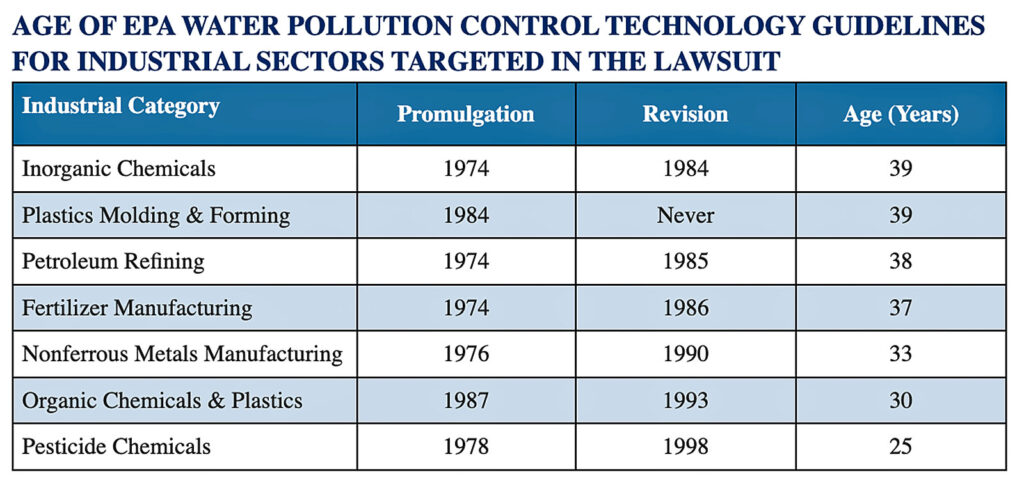
EPA failed to regulate billions of gallons of industrial wastewater laced with toxic chemicals, lawsuit alleges
Thursday, April 13, 2023 by News Editors
http://www.biosludge.news/2023-04-13-epa-failed-to-regulate-gallons-industrial-wastewater.html

Tennessee Riverkeeper and a coalition of environmental groups on Tuesday filed a federal lawsuit against the U.S. Environmental Protection Agency (EPA) for failing to set limits on harmful chemicals like cyanide, benzene, mercury and chlorides in the billions of gallons of wastewater pouring out of U.S. oil refineries, chemical plants and factories that manufacture plastics, pesticides, fertilizer and nonferrous metals.
(Article by Tennessee Riverkeeper republished from ChildrensHealthDefense.org)
The Clean Water Act requires the EPA to limit discharges of industrial pollutants based on the best available wastewater treatment methods and to tighten those limits at least once every five years when data show treatment technologies have improved.
But the EPA has never set limits for many pollutants and has failed to update the few decades-old limits that exist — including limits set almost 40 years ago for oil refineries (1985), plastics manufacturers (1984) and fertilizer plants (1986).
“Pollution from plastics, pesticides, petroleum and a grim litany of other toxins continue to plague public water supplies,” said David Whiteside, founder of Tennessee Riverkeeper. “The Clean Water Act requires factories to use the best available methods to treat their pollution, but the government has failed to enforce this provision.”
The lawsuit filed Tuesday seeks to reduce “a vast array of toxins in our environment from numerous industries by requiring polluters to finally use modern technology and obey the law,” Whiteside said.
The lawsuit was filed in the U.S. Court of Appeals for the 9th Circuit in San Francisco by the Environmental Integrity Project, the Center for Biological Diversity, Clean Water Action, Waterkeeper Alliance, Food & Water Watch, Environment America, Bayou City Waterkeeper, Black Warrior Riverkeeper, Healthy Gulf, San Antonio Bay Estuarine Waterkeeper, San Francisco Baykeeper, the Surfrider Foundation and Tennessee Riverkeeper.
The lawsuit challenges EPA’s decision on Jan. 31 not to update outdated and weak water pollution control technology standards (called “effluent limitation guidelines” or ELGs and pretreatment standards) for seven key industrial sectors: petroleum refineries, inorganic and organic chemical manufacturers, and factories that manufacture plastics, fertilizer, pesticide, and nonferrous metals.
Two factories in Decatur are cited in the lawsuit: Ascend Performance Materials Operations and Indorama Ventures Xylenes and PTA.
Despite the legal mandate for regular reviews and updates to keep pace with technology, the guidelines for 40 of 59 industries regulated by the EPA were last updated 30 or more years ago, with 17 of those dating back to the 1970s.
Outdated standards mean more water pollution is pouring into U.S. waters than should be allowed because some plants are using technology standards from the Reagan era — before the common use of the internet, email or cellphones.
“No one should get a free pass to pollute,” said Jen Duggan, deputy director of the Environmental Integrity Project, which coordinated the action by the 13 environmental groups. Duggan added:
“It’s completely unacceptable that EPA has, for decades, ignored the law and failed to require modern wastewater pollution controls for oil refineries and petrochemical and plastics plants.
“We expect EPA to do its job and protect America’s waterways and public health as required by the Clean Water Act.”
A Jan. 26 report by the Environmental Integrity Project, “Oil’s Unchecked Outfalls,” revealed that 81 refineries across the U.S. discharged into waterways 15.7 million pounds of algae-feeding nitrogen in 2021 — as much as from 128 municipal sewage plants — along with 60,000 pounds of selenium (which can cause mutations in fish), among other pollutants.
The six other industries with weak and outdated EPA effluent guidelines targeted in the lawsuit filed by the environmental groups are:
- Organic chemical and plastics plants: EPA estimates that 609 facilities across the U.S. manufacture plastic resins, PFAS “forever chemicals,” synthetic fibers (rayon, polyester, etc.), and other chemicals and discharge pollution to waterways. These plants release millions of pounds of pollution every year, including nitrogen, benzene and lead.
The effluent guidelines for this sector have not been updated since 1993 and have no limits on, for example, stormwater pollution or on plastic pellets — called “nurdles” — that often escape in stormwater or wastewater.
- Plastics molding and forming: 120 plants that mold and form plastic products discharge into U.S. waterways, according to an EPA estimate. But the agency has not revised its technology-based limits for this sector since EPA first set the limits in 1984, almost 40 years ago, even though the standards are supposed to reflect “best available technology.”
Among the toxic pollutants discharged by this industry without any federal limits are phthalates, PFAS, nitrogen, N-N-Dimethylformamide, and microplastics in stormwater.
- Fertilizer manufacturing: EPA estimates that 59 chemical fertilizer manufacturing plants discharged nearly 90 million pounds of pollution into waterways in 2019. Among these are 21 plants that make nitrogen-based fertilizers and release millions of pounds of nitrogen into U.S. waterways.
EPA has set no limits on several fertilizer plant pollutants, including selenium, total chromium, zinc, iron, nickel, cadmium, cyanide and lead. The current effluent guidelines for fertilizer factories have not been updated since 1986.
- Nonferrous metal manufacturing: 56 facilities in this manufacturing sector (metals excluding iron and steel) dumped more than 100 million pounds of pollution into waterways in 2019, according to an EPA estimate.
But pollution control guidelines for this industry have not been updated since 1990 and the current limits for this industry do not include any controls on stormwater pollution, for example.
- Inorganic chemicals plants: Inorganic chemical plants, which make products like vinyl chloride, are one of the largest industrial dischargers of toxic pollution in the U.S., with 229 factories dumping over 2 billion pounds of pollution into waterways in 2019, according to an EPA estimate. But EPA has not updated pollution limits for this sector since 1984.
- Pesticide manufacturing: EPA estimates that 31 pesticide chemical plants discharge pollution into U.S. waterways, including the insect-killing ingredients being manufactured, as well as nitrogen, benzene, cyanide and more. But EPA has not made updates to the guidelines for pesticide manufacturing since 1998.

Outdated pollution control technology standards meant that, for example, 81 oil refineries across the U.S. dumped 15.7 million pounds of nitrogen and 1.6 billion pounds of chlorides, sulfates, and other dissolved solids (which can be harmful to aquatic life) into waterways in 2021.
Twenty-one nitrogen fertilizer plants discharged 7.7 million pounds of total nitrogen, which causes algae blooms and fish-killing “dead zones” and proposed new plants will add millions of additional pounds to that load.
The EPA estimates that 229 inorganic chemical plants dumped over 2 billion pounds of pollution into waterways in 2019.
“It is a shame EPA has allowed industrial polluters such as chemical plants and oil refineries to escape accountability under the Clean Water Act by operating for decades without proper pollution controls in place,” said Nelson Brooke of Black Warrior Riverkeeper.
“It is imperative EPA swiftly right these wrongs by requiring modern pollution controls for industrial facilities in order to protect rivers and all the people and critters who depend on them to be clean and safe,” Brooke added.
Read more at: ChildrensHealthDefense.org
Tagged Under: Tags: badpollution, big government, clean water, Ecology, environment, EPA, fertilizer, industrial pollution, industrial wastewater, metals, microplastics, oil refineries, pesticides, poison, toxic chemicals, toxic water, toxins, water pollution
RECENT ARTICLES


EPA failed to regulate billions of gallons of industrial wastewater laced with toxic chemicals, lawsuit alleges
By News Editors

Elon Musk wants to discharge industrial waste into the Colorado River of Central Texas as part of The Boring Company expansion
By Ethan Huff

Former EPA scientist exposes corruption at the highest levels of government – soil pollution, biosludge, dioxins and bioterrorism threats

EPA scientist and whistleblower Dr. David Lewis interviewed by Mike Adams: Train wrecks, dioxins, biosludge and the EPA’s pollution protection racket
By Mike Adams
COPYRIGHT © 2017 BIO SLUDGE NEWS


